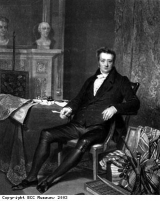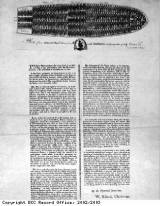Ending the slave trade: the campaigners
From the 1550s onwards, there had been occasional protests about the enslavement of human beings and the trade in slaves. It was not, however, until the mid-18th century that opposition to the slave trade became a major issue.
This campaign was often lead by members of the non-conformist churches (these were churches that had split away from the main Church of England). The Quakers were one such group. They had started to think about the issue in the late 17th century, but only banned slave-trading amongst their members in 1760. John Wesley, the leader of the Methodist Church, preached against slavery in the 1770s. Some of the Church of England clergy and members were also involved. The Bishop of Chester, for example, preached against slavery to the Society for the Propagation of the Gospels. This Society owned large slave plantations on the island of Antigua in the Caribbean. Not all Christians were opposed to the slave trade.
The campaign to end the slave trade, called Abolition, took many years. It was opposed by many. Some people thought that Britain would suffer economically if plantations were to be deprived of the slaves that worked on them. The Abolition campaign continued, and eventually the trade in slaves was stopped in 1807.




